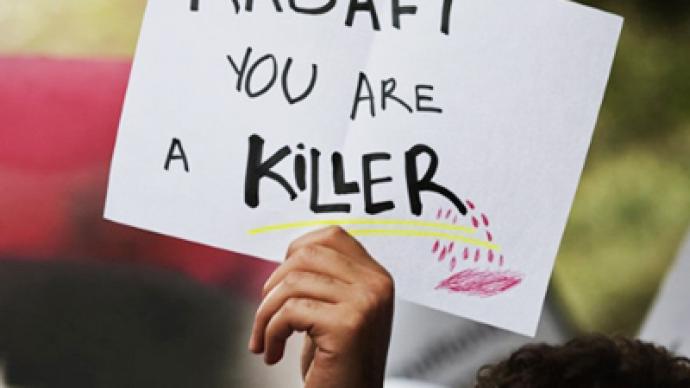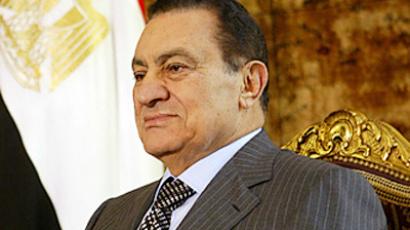Libya’s Gaddafi under mounting pressure to go

Protesters in the Libyan capital Tripoli have set the parliament building on fire. They are urging the country’s leader Colonel Muammar Gaddafi to step down. The military has reportedly launched an air strike on demonstrators in the city of Benghazi.
Gaddafi’s son, Seif Al-Islam Gaddafi, earlier warned that Libya is on the verge of civil war.In a televised national address, Seif Al-Islam Gaddafi said that 14 people died in clashes in Tripoli and 84 in Libya's second-largest city Benghazi. He blamed Islamists and separatists for the violence, but admitted the army's mistakes in tackling the riots.Seif Al-Islam Gaddafi also dismissed reports that his father has fled the country, insisting that Colonel Gaddafi remains in Libya and is backed by the army.He also confirmed that rioters had seized military bases, tanks and other equipment, and warned of a looming civil war that would wipe out the nation’s oil wealth.A group of Libyan religious leaders declared that any revolt against Colonel Gaddafi would be a sacred duty of any Muslim, Reuters reports.According to unconfirmed reports in the media, government forces have launched an air strike on the protestors in Benghazi. No information about casualties is available at the moment. The assault was reportedly aimed against a military base where personnel took the side of the protestors.Meanwhile, the protesters have seized control of Tripoli’s international airport, Itar-Tass reports, with reference to the CNN Turk network. According to that report, a Turkish passenger plane which was sent to evacuate Turkish citizens from the Libyan capital was not able to land because the building is reportedly under the full control of anti-government protestors.However, this information has not been sufficiently confirmed yet, and other sources stress that the evacuation of foreign nationals is underway, and that the airport is operating normally.According to RIA Novosti, the Russian monopoly Russian Railways is preparing a flight to evacuate 204 of its employees who are currently stationed in Libya.Earlier on Monday, the clashes spread to the capital, where police were said to be using tear gas and live rounds to disperse the rioters. Reports are coming in from four separate protests underway in the Libyan capital of Tripoli.Human rights activists claim snipers targeted demonstrators demanding an end to the 42-year rule of Gaddafi. International organizations are putting the death toll in Libya at well over 600, mostly in the country's second city, Benghazi. Unconfirmed reports coming from the city also suggest that some members of an army unit have sided with protesters.
Developments across region
Meanwhile, in other developments across the region, rioters continued to clash with government supporters in the Yemeni capital, Sanaa, with gunfire heard on the streets.While in Bahrain, the opposition is preparing for talks with authorities, after deadly clashes with government forces saw six people killed and dozens wounded.Morocco is also seeing unrest, with at least 5,000 people taking to the streets of the capital Rabat, demanding King Mohammed give up some of his powers.
Last week, US Secretary of State Hillary Clinton reiterated calls for unrestricted internet access for all, promising another US$25 million to help fight repressive regimes online. According to investigative journalist Webster Tarpley, Washington is using social media to drive revolts in the greater Middle East, mirroring the color revolutions of the post-Soviet space.“What Hillary Clinton talked about is ‘digital activists’, in other words, there is a youth bulge around the world. They want to mobilize these people,” he said. “I think what she had in mind is a secret army of hackers … and that is what they were able to deploy in Egypt.” “It is simple: you get the rich kids using Facebook and Twitter, you get the rich kids into the square. You put that on television. You convince the rest of the society that the government is deeply unpopular and the revolution takes off,” Tarpley added.
John Laughland from the Institute of Democracy and Cooperation in Paris agrees that a lot of the “technicians” of the regime change have been active during the latest events in the region.“In the case of Egypt, as in the case of other countries, the interest of the United States is to present the appearance of change while maintaining political control,” he said. “That is what the Americans are about: revolutions serve to legitimize a continuation of the status quo effectively.”“‘Everything must change so that everything stays the same.’ And that’s, really, the motto of the Americans in these situations,” Laughland concluded.
US has eye on oil
The unfolding violence in the Greater Middle East hurts stocks, with oil prices rocketing. It ultimately hurts the US dollar positions and moves the global economy closer to a new currency grid, says Max Keiser, economist and host of RT's Keiser Report.“The rise in the price of oil has been going on for a number of years now as a result of two forces in the economy”, says Keiser. “You’ve got primarily the inflationary forces with a lot of money-printing going on, as these various countries are engaged in what’s known as a currency war. They are trying to export their way out of their economic doldrums. And they do this by printing money, in a sense, the perverse effect of driving the price of oil higher.”It is also been revealed by WikiLeaks that Saudi Arabia seems to have been overstating its oil reserves by up to 40 per cent, which keeps in line with the general dropping of oil production all over the world. This, and the currency war, is playing down the US dollar and, to a lesser extent, the euro. “We are going to enter a new global currency arrangement”, concludes Keiser.
It is no wonder the oil prices are rising, as Libya is the 12th-largest oil exporter in the world, noted Gayane Chichakyan, RT’s correspondent in Washington. Moreover, the protests in Libya are much more violent than in Egypt or elsewhere in the Middle East.The main question now is who will control the Suez Canal and major oil-shipping lanes, says Chichakyan. Washington has its fleet in Bahrain to control the canal, but Bahrain now is in deep crisis. The US might be losing control in the Middle East, Chichakyan suggested, and the instability in the region is a severe blow for the US economy both in the short and long term.“Given all the big interests at stake in the region, there is no more democracy chanting going on in Washington,” stated the correspondent.“It was a little more than a week ago when Obama delivered all those passionate speeches about the people of Egypt making their voice heard and embracing democracy. There is no more of that now, with the exception of Iran, of course. The US is for anything that is against the Iranian leadership. But the situation in other countries seems to have spiraled out of control,” said Chichakyan.The US is really cautious now about calling for democracy in the countries where they have no leverage. Instead of pushing for democracy, Washington will concentrate on preserving its own interests in the region, Chichikyan concluded.
Aziz Abu Sarah, a Middle East scholar at George Mason University, says the US has taken a weak stance on these revolts because it is afraid of more revolts in Arab countries. "The US has been noticeably absent throughout the whole process – from Tunisia to Egypt, now to Bahrain, which it has almost been silent on, to Libya." And, he says, it has followed this policy because it afraid that the fall of the regime in Libya will create more revolts in other Arab countries. Because of Tunisia and then Egypt, there have been more revolts and many more have been protesting in other Arab countries. And the assumption is that if Libya falls, he argued, then youth in other countries that we haven’t been expecting to protest will also start protesting. But the US is also looking at its short-term interests, and they are looking at the oil, he continued, because Libya is a very important oil exporter."
Oxford University historian Mark Almond says the wave of uprisings in the Middle East have their roots in social inequality, including discrimination against Shiites minorities, especially in sharing the wealth from oil production. For all their aspiration to build a new world for themselves, many Arabs do not view the West as a model for building democratic processes in their countries, Almond argued. Many Arabs “don’t necessarily feel gratitude to the West or feel any desire to join our club.”The West doesn’t “have the power to stop it spiraling out of control,” he added. “In one sense, the United States has had the power to engage uncreative destruction to help to start up the trouble. But now the trouble is out of the control of the United States.”
American military strategist and historian Edward Luttwak says the people may want change in the Middle East, but the foundations for democracy are not yet set in place.“Democracy is not something you can buy in a shop,” he said. “It takes centuries of development to get a democracy. But this stage of development, religion is much more meaningful then democracy. And to have a democracy you have to really have respect for human rights, and personal, individual rights.”














